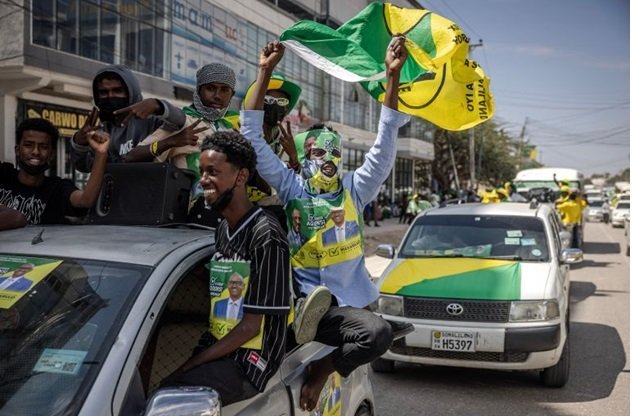By Abdirahman Mohamed
Since its self declaration of independence from Somalia in 1991, Somaliland has set itself apart as a beacon of stability and democratic governance in the Horn of Africa. Central to this reputation is its successful implementation of the One Person, One Vote (1P1V) system—a democratic hallmark that has been a cornerstone of Somaliland’s political process since 2001 (Please click the link to learn more about the History of NEC )

Unlike many states in the region, where elections are often marred by allegations of fraud, clan favoritism, and violence, Somaliland has consistently demonstrated its ability to hold peaceful, transparent, and inclusive elections. With all major political parties endorsing the 1P1V system, the region has showcased a level of political maturity that stands in stark contrast to the instability in neighboring Somalia.
A Proven Track Record
Somaliland began its journey with 1P1V elections in 2001, starting with a constitutional referendum that paved the way for multi-party politics. Over the years, the region has held multiple elections, including presidential, parliamentary, and local council polls, under this system. Each election has been a testament to the resilience of Somaliland’s institutions and its commitment to democratic principles.
Observers have lauded the fairness and transparency of Somaliland’s electoral process. With an independent National Electoral Commission (NEC) overseeing the elections, public trust in the system has remained high. Political parties—whether in power or opposition—have expressed confidence in the 1P1V framework, viewing it as a fair mechanism for political competition and representation.
Political Unity Around 1P1V
One of Somaliland’s key achievements is the broad consensus among its political actors regarding the 1P1V system. The three main political parties—Kulmiye (ruling party), Waddani, and UCID (opposition parties)—all recognize the system as an essential pillar of Somaliland’s democratic identity.
As the early counting indicates, the Wadani Party is leading this time, with the Kulmiye Party coming in second, while the UCID Party has faced a significant defeat and is set to be dissolved.

Unlike Somalia, where electoral processes are often divisive, Somaliland’s political landscape is characterized by cooperation and a shared commitment to upholding democratic norms. The consistent participation of all parties in 1P1V elections underscores their confidence in the system’s integrity.This unity has been a critical factor in ensuring political stability and fostering a sense of ownership among the citizens. While disagreements between parties are inevitable in any democracy, Somaliland’s ability to resolve disputes through dialogue and compromise has been key to its success.
Lessons Learned and Institutional Growth
Over two decades of implementing 1P1V elections have provided Somaliland with valuable experience. The region has refined its electoral processes, ensuring greater inclusivity and efficiency. From voter registration to dispute resolution mechanisms, Somaliland has built institutions capable of managing complex electoral challenges.
The NEC’s independence and professionalism have been widely praised. Efforts to improve voter education, deploy biometric voter registration, and engage civil society organizations have further strengthened the credibility of Somaliland’s elections.
Additionally, the peaceful transfer of power following elections has become a hallmark of Somaliland’s political culture. Leaders, whether winners or losers, have generally respected the will of the people, reinforcing public confidence in democracy.
A Stark Contrast to Somalia
Somaliland’s success with 1P1V elections highlights the stark contrast with Somalia, where elections remain contentious. Somalia’s federal government has struggled to implement direct elections, with political divisions, insecurity, and logistical challenges undermining its electoral process.
In contrast, Somaliland has demonstrated that inclusive, transparent, and fair elections are possible even in a fragile political environment. Its experience offers a valuable model for the region, showing that grassroots democracy and strong institutions can pave the way for stability and development.
International Recognition and Support
Despite its achievements, Somaliland’s lack of international recognition remains a significant challenge. The region’s leadership continues to advocate for recognition, arguing that its democratic track record sets it apart from Somalia and other states in the Horn of Africa.
The international community has taken note of Somaliland’s democratic progress, with election observers regularly commending the 1P1V system. Donors have provided support for electoral processes, acknowledging Somaliland as a rare success story in a region where democracy often falters.
However, Somaliland’s leaders emphasize that recognition would provide the legitimacy and resources needed to sustain and enhance its democratic institutions.
Moving Forward
As Somaliland successfully wraps up the currently ongoing 1P1V elections on the one hand and prepares for its next round of elections under the 1P1V framework on the other hand, the region faces opportunities and challenges. Ensuring security, managing disputes fairly, and maintaining public trust will be critical to the continued success of its democratic experiment.
Beyond internal governance, Somaliland must also prioritize external dialogue, particularly with Puntland and Khatumo-SSC, to address the longstanding disputes and foster greater regional stability. Building trust and initiating peaceful negotiations with these neighboring entities will be crucial for enhancing security, promoting cooperation, economic development, and ensuring a more stable future for the wider region.
Somaliland’s commitment to democracy serves as a powerful reminder that stability and progress are achievable, even in the most challenging environments. Its experience with 1P1V elections is not just a triumph for its people but a lesson in resilience, governance, and hope for the wider region.
For Somaliland, the future looks promising. As its citizens continue to participate in shaping their nation’s destiny, the world watches with admiration and anticipation, hoping that its democratic journey inspires others in the Horn of Africa and beyond.
Abdirahman Mohamed
Email: abdirahmanmohamed1021@gmail.com

Leave a Reply